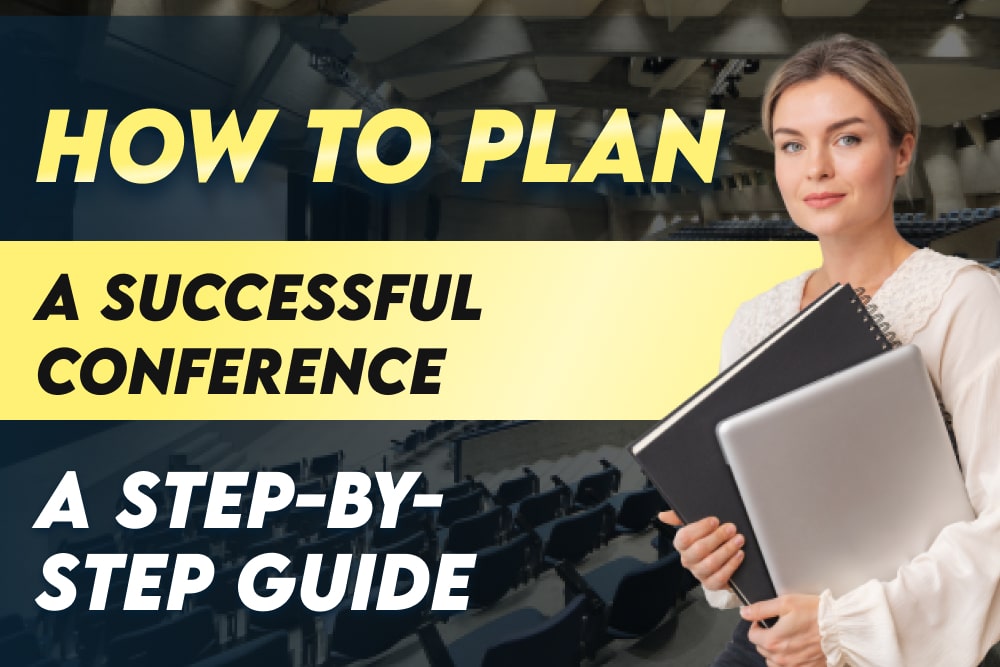

Head of HR at Rent For Event

Head of HR at Rent For Event
Conferences hold immense importance, shaping industries and fostering innovation. Our guide equips you with essential steps for planning a memorable event. From selecting the right venue to maximizing the attendee experience, we cover it all.
If you want the event to look really amazing, you can ask special companies for help. They can bring big screens with colorful lights and make the place look really beautiful. Learn effective marketing strategies and ensure flawless on-site execution.
Join us as we unveil the secrets to planning a conference that leaves a lasting impact.

Conference planners are like superheroes who bring smart and talented people together to learn and have fun. They work really hard to come up with great ideas and make sure everything happens just right. Their job is to make sure everyone has a super awesome time at the conference.
They plan fun activities, take care of all the important stuff, and make sure the conference is a big success.
If you want to make the conference really good, you can ask for help from special people who know how to plan events. They are experts in organizing everything and making sure it all works smoothly. They can make the conference even better! Here are some key benefits they bring:
When you plan a conference, you make sure everything is done right so it becomes a special and fun event. When we plan something like a conference, it’s like making a plan for a really fun party. When we want to have a fun party, we need to plan it carefully.
Planning helps us make the party successful and ensures that everything goes well. It’s also good to ask for help from people who know how to make parties great. When we know these things, we can make good plans and make sure the party is awesome!
When you want to have a fun conference, it’s important to plan ahead. Planning helps make the event successful and ensures everything goes well. It’s also good to work with people who know how to make events great. When the organizers have this knowledge, they can feel confident in their plans and make sure everyone has a good time.
Budgeting considerations:
Choosing the right venue and location:
Creating a conference planning checklist:
To have a fun conference that works well, remember four things: know what you want, how much money you have, find a good place, and make a big list of things to do. This will help you start the conference in a strong and organized way.
To make the conference really special, we need to plan a great program. This means deciding on the main ideas and topics we want to talk about. We also choose cool people to speak and plan when they will talk.
We can also add fun activities for everyone to enjoy. Let’s start by deciding what we want to talk about at the conference!
Selecting and inviting speakers and panelists:
Scheduling sessions, workshops, and networking events:
Incorporating interactive elements for attendee engagement:
Considering the use of projector and screen rental and projectors for visual presentations:
Planning a conference means making a special event where people feel happy, learn new stuff, and make new friends. To do this, you invite important people to talk, choose interesting things to talk about, and have fun activities. It’s also fun to use big screens and projectors to make everything look really cool and get everyone to join in.
To make a conference great, there are many things that need to be organized and planned. One important thing is finding a place for people to stay when they come to the conference. This helps them feel comfortable and ready for the event.
Managing transportation and parking logistics:
Coordinating catering services and dietary requirements:
Securing necessary permits and insurance:
Exploring lighting rental options for ambiance and stage setup:
When you plan a conference, you take care of everything so that people have a good time. You find them nice places to stay, make sure they have a way to get there, give them yummy food, and keep them safe. Doing all of this makes the conference really awesome for everyone!
To make your conference popular and exciting, you need to tell lots of people about it. In this part, we’ll talk about how to do that. In this part, we’ll learn how to make a special website just for the conference.
We’ll also learn how to use social media to tell a lot of people about the conference and make them excited to come. We’ll also work with important people who help make the conference even more awesome. Let’s start by learning how to make a great plan to tell everyone about the conference!
Creating a conference website and online registration system:
Utilizing social media platforms and email marketing campaigns:
Collaborating with partners, sponsors, and influencers:
To make sure lots of people come to your event, you need to do a few things. First, make a plan to tell everyone about it. Then, make a special website that makes people want to come. Use social media like Facebook and Instagram to share about your event. Also, work with friends and popular people who can help you spread the word. By doing all these things, more people will know about your event and it will be really fun!
The moment has arrived to bring your meticulously planned conference to life. In this part, we’ll talk about how to make everything run smoothly during the conference. We’ll learn about making a timeline and schedule, which helps us know what happens when.
We’ll also talk about things like making sure the sound and video are good and organizing all the people who help make the conference happen.
Setting up registration and check-in processes:
Coordinating audiovisual and technical requirements:
Ensuring smooth transitions between sessions:
Overseeing logistics, staff, and volunteers:
When it’s time for the conference to happen, we make sure everything goes really well. We have a schedule to know what happens when, we help people register easily, and we make sure the things we need for sound and pictures work great.
We also take care of all the little details to make sure everything runs smoothly.
The end of a conference doesn’t mark the end of its impact. In fact, post-conference activities are just as important as the event itself. In this part, we’ll talk about what happens after the conference is over.
We’ll learn how to ask people what they thought about the conference, including the people who came, the speakers, and the sponsors. This helps us understand what worked well and what we can do better next time.
Analyzing conference metrics and success indicators:
Sending post-conference surveys and thank-you emails:
Sharing conference highlights and content through various channels:
After the conference is over, you can find out if it went well by asking people what they thought, looking at numbers, and telling everyone the best parts. You can also ask people questions and say thank you to make them happy and want to come back next time.
This guide will give you helpful tips for planning a really good conference. Follow the steps and ideas it gives you to make a conference that people will remember. Keep the guide with you while you plan and use it to help you at every step.
Good luck with your conference and make it a special and amazing event!